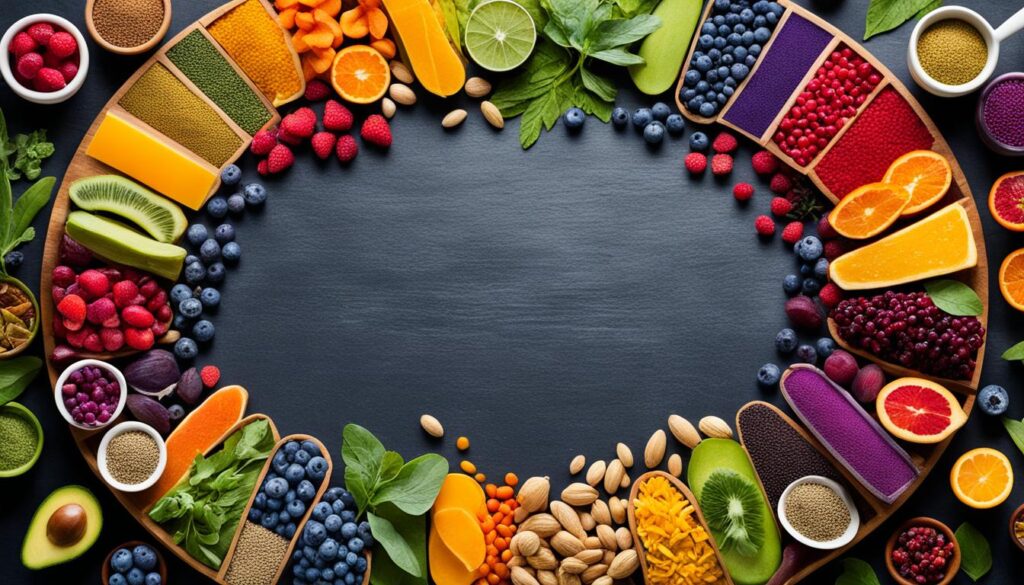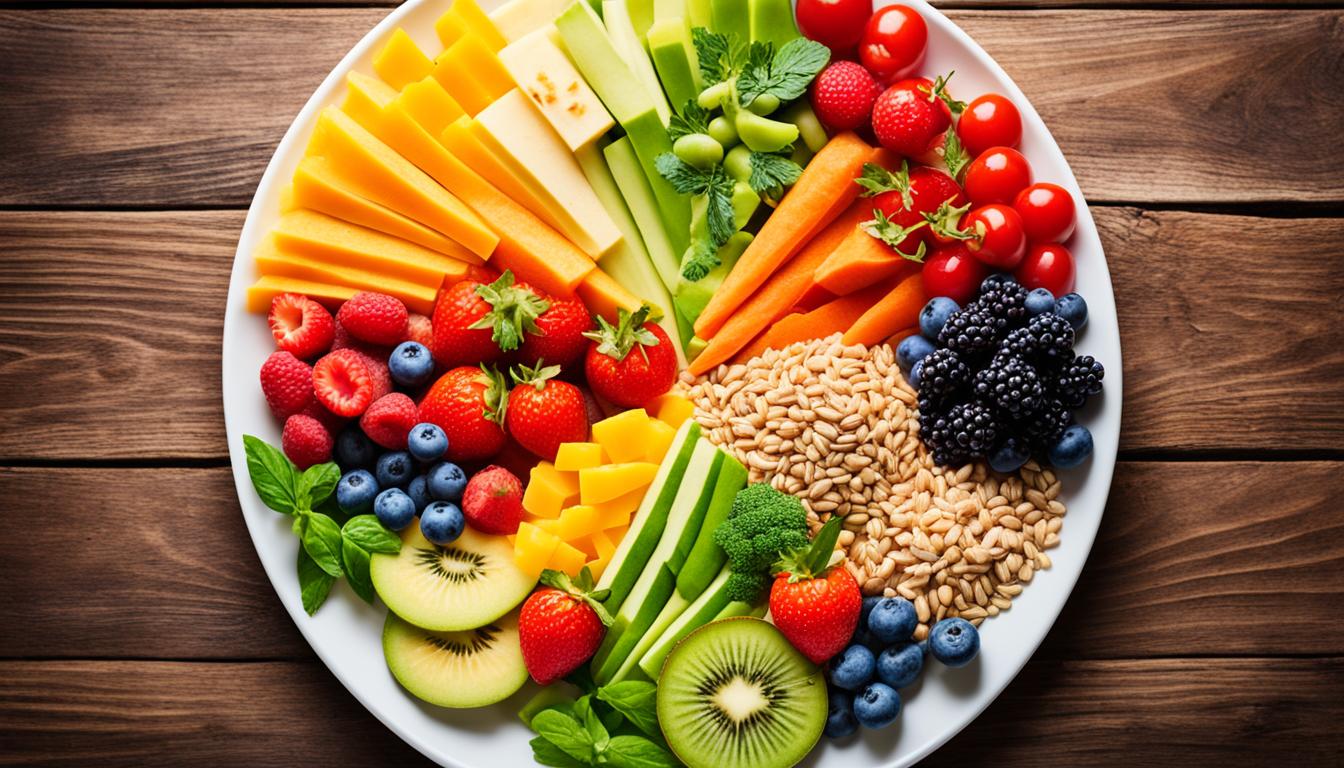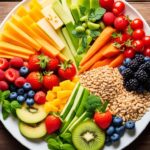Are you tired of feeling sluggish? Do you want to jumpstart your health? This guide is perfect for you. It’s filled with tasty, healthy recipes and useful advice to change your life. You can begin a journey to a better, more balanced way of eating that’s also fun.
Here, you’ll learn why knowing about nutrition is important. We’ll talk about food groups, key nutrients, and the right meal sizes for good health.1 We’ll also look into mindful eating, which includes enjoying your food and understanding when you’re truly hungry. Plus, you’ll get meal planning tips for when life gets busy.2
But we’re just getting started! Get ready to learn the perks of adding plant foods and superfoods to your meals. You’ll also find out how being well-hydrated can make you more lively and healthy.1
Ready to turn your eating habits around for the better? This article is the perfect starting point for upgrading your lifestyle. Follow along to find your way to a tastier and more health-conscious you.
Key Takeaways
- Understand the importance of balanced nutrition and the role of food groups, essential nutrients, and portion control.
- Discover the transformative power of mindful eating practices, such as savoring every bite and recognizing hunger and fullness cues.
- Learn practical meal planning strategies to navigate busy lifestyles and ensure access to nourishing, delicious meals.
- Explore the benefits of incorporating plant-based foods and superfoods into your diet for optimal health.
- Uncover the secrets to staying hydrated and maintaining a healthy, vibrant lifestyle.
Understanding Balanced Nutrition
To stay healthy, a balanced diet is crucial. This means knowing why fruits, vegetables, grains, proteins, and fats are important. When you eat these foods, your body gets all the right nutrients.
The Importance of Food Groups
Fruits and veggies have vitamins and antioxidants. These boost your immune system and fight off diseases.1 Whole grains offer energy and help your digestion. Proteins repair your body, while healthy fats aid heart health.
Nutrients and Their Functions
It’s also key to understand what nutrients do. Carbs give you energy, proteins help build cells, and fats are for storage and hormones.1 Vitamins and minerals are essential for your health in many ways. Eating a mix of these helps your body work well.
Portion Control for Optimal Health
Controlling how much you eat is important.3 Men should aim for about 2,500 calories a day, and women 2,000.3 Yet, many in the UK eat too much. So, watching your portions can help avoid health problems.
It’s also vital to manage how much saturated fat and sodium you take in. For a healthy heart, men should limit saturated fat to 30g a day, and women to 20g. Both should keep sodium under 6g daily.3
Mindful Eating Practices
Mindful eating helps us build a better connection with our food. It’s about the art of
Savoring Every Bite
, which means taking time to enjoy the taste, feel, and smell of what we eat. It’s about being fully there when we eat.4Eating slowly lets us really savor each bite. This makes it easier to know when our body has had enough to eat.
Recognizing Hunger and Fullness Cues
. Over time, we can learn to listen to our bodies more. This might help us avoid eating too much or too little.4When we eat mindfully, we often make better choices. Plus, it can help our body digest food better.4Choosing what we eat with care becomes more natural with mindful eating. Instead of food for comfort, we look for what’s nutritious. This helps us feel closer to nature and more grateful.5 It can also make us less stressed by encouraging us to enjoy the present.4
By practicing mindful eating, we improve our health in body and mind.5 This way of eating makes us feel good about our food choices. It leads to a diet that sustains us and a life that’s full of happiness and health.
Meal Planning for Busy Lifestyles
Keeping a healthy diet is tough when our lives are busy. With some planning, though, healthy meals can be easy to grab on busy days.6
Preparing Wholesome Meals in Advance
Meal prep can keep you eating right. It saves cash, time, and helps you keep your weight in check.6 It also lets you plan your meals’ nutrition and cut back on stress.6
Prep depends on what you like to eat, your skill in the kitchen, and your daily routine.6 By making meals ahead, you’ll have lots of healthy choices. This makes it easier to skip fast food when you’re in a rush.
Grocery Shopping Strategies
Planning your meals before you shop is the best way to eat well without overspending.6 Try to make dinners for 2-3 days at a time when you start.6
It’s key to keep food fresh in the fridge or freezer to avoid waste.6 For example, you can keep cooked ground meat for 1-2 days, but whole meats last 3-4 days.6
Cheeses can last a while in the fridge, but frozen foods like soups or veggies last even longer.6
7Batch cooking, prepping snacks, and having ingredients ready are good ways to manage your meals.7 Buying the right gear, like meal-prep containers, can make it all easier.7
There are also apps to help you plan, track your food, and make shopping lists. They cut down on the stress of deciding what to eat.7
7Keeping nuts, fruits, and veggie snacks on hand is a smart choice for busy days.7 And even at fast food places, you can pick healthier options like salads or grilled chicken.7
By using these tips, you can always have a healthy, homemade meal ready. It’s good for your health and wallet. Plus, it saves you time when life is really busy.
Incorporating Plant-Based Foods
Eating more plants is great for you and the planet. It lowers your risk of getting sick and helps your body work better. You get lots of good stuff like vitamins and minerals. Plus, it cuts down on water use and can make more food for everyone.8
A plant-rich diet is not just good for you. It’s good for the environment, too. Studies say choosing more plants over animals can save water and grow more food. And we can do this without using more land.8
Benefits of a Plant-Rich Diet
There are many good reasons to eat more plants. For one, you might lose weight. 19 studies showed this.9 Also, eating lots of plants can help your heart. It makes heart disease less likely than eating a lot of meat and dairy.9 You’re also less likely to get Type 2 diabetes. Plant-based diets were even better for people with diabetes than what doctors usually suggest.9
Creative Ways to Add More Veggies
Adding more veggies to your meals is fun and healthy. Start by trying new recipes. You can also hide veggies in your usual meals. For example, mix cauliflower into pasta sauce or add greens to your smoothies.8
Finding plant-based meals is easy at dining spots. Just look for the V for vegan or the LO for vegetarian.8
Making plants a big part of your diet brings lots of perks. You’ll feel better, help the planet, and discover tasty foods.89 There’s plenty of ways to enjoy plant-based meals. You don’t have to be a pro to make them part of your diet.89
Discovering Superfoods

Superfoods bring amazing vitamins and minerals to your table, boosting your health. They are a special group of foods packed with nutrient benefits. Green veggies and sweet fruits lead this nutritional charge.
Nutrient-Dense Powerhouses
Dark greens like kale and spinach, along with berries, are full of good stuff. They help lower heart and cancer risks10. Green tea also comes in, fighting off big health problems10. This is just the start of what superfoods can do for you.
The world is catching on, with a big jump in new “superfoods” in 2015, especially in the US11. Quinoa, chia, and kale remain top picks. And now, we’re exploring things like pea protein and seaweed11.
Superfoods for Specific Health Goals
Superfoods aren’t just healthy; they can target your health needs. Eating eggs regularly doesn’t up your heart or diabetes risk10. They’re great for your heart and metabolism. Legumes help with diabetes, blood pressure, and cholesterol10. Nuts and seeds protect your heart10.
Kefir improves your gut and lowers cholesterol, while garlic and olive oil are heart heroes10. Ginger and turmeric fight off diseases and pain10. Adding these to your meals means more than just flavor. They offer a better, healthier life.
Staying Hydrated

Hydration is key for good health and feeling well. It keeps our body cool, brain sharp, and helps digest food.12 How much water we need changes with the weather, what we wear, and how hard and long we exercise.12 Some health issues mean you should drink more water, like if you have diabetes or heart disease.12 People with cystic fibrosis, who sweat out a lot of salt, must always be careful not to become dehydrated.12
Feeling thirsty does not always mean you’re dehydrated.12 Checking the color of your urine can tell you more. If it’s pale and clear, you’re likely well-hydrated.12 For those who work out hard, weighing yourself before and after can show how much water you’ve lost. You should aim to drink a pint of water for every pound lost.12 For instance, high school football players might sweat off over 5 pounds when practicing in the summer.12
Most of the time, water is your best drink.12 But, during tough workouts in hot weather, sports drinks with electrolytes can help.12 It’s wise to have water during your exercise and then snack on fruits or nuts after. Avoid drinks with lots of sugar or that have caffeine.12 Staying well-hydrated is important for anyone, not just athletes. It’s critical for people out in the sun, those with heart troubles, people over 50, the overweight, and travelers.12
Getting enough water and choosing the right foods and drinks can make a big difference in health. Visiting the heart.org website can help you learn more about staying hydrated and healthy.
Healthy Eating Tips for Weight Management
Getting to a healthy weight and staying there is hard work. But it’s doable with the right mindset. It’s important to know about calorie density and how it impacts portion size.1 When we pick our foods wisely and watch how much we eat, we cut calories but still feel full.
Calorie Density and Portion Control
Calorie density shows us how many calories a certain food has in each gram. Foods like fruits, veggies, and lean meats are lower in calories but fill you up.3 Meanwhile, treats like snacks and soda, with more calories for their size, can make you eat too much. By sticking to smaller portions of low-density calorie foods, you meet your weight goals happily.
Nutrient-Rich, Low-Calorie Options
Don’t forget about getting nutrients when looking at calories.1 Go for dark greens, fruits, lean meats, and whole grains. These choices help keep you full on fewer calories and provide essential nutrients for your health.
Learning about calories and portions is key to managing weight. Adding nutrient-rich, low-calorie foods to your menu is a big step.3 This kind of eating supports your health long term without feeling like you’re missing out.
Cooking Techniques for Delicious, Healthy Meals
Healthy and tasty meals rely on how you cook them. Using cooking methods like baking, grilling, and sautéing is key. These methods help keep the ingredients’ nutrients and lower the fats you use.13
Baking, Grilling, and Sautéing
Healthy cooking techniques like baking, grilling, and sautéing can make any dish amazing. Baking doesn’t need as much oil as frying. Grilling adds a smoky taste with less oil. And sautéing locks in nutrients and flavors fast.13
With practice, you’ll whip up delicious, healthy meals easily. Think roasted veggies, baked chicken, grilled fish, or sautéed stir-fries. Your options for tasty, nutritious food are limitless.13
Flavorful Seasoning and Marinades
Seasoning and marinating are as important as the cooking itself. Stay away from too much salt, sugar, or bad fats. Instead, use various flavorful seasonings and marinades. They make your food taste great without the unhealthy stuff.13
Herbs, spices, and vinegar marinate are great for flavor. They cut down on sodium, sugar, and bad fats. By mixing these with healthy cooking techniques, you’ll cook meals packed with great tastes and good health.13
Healthy Eating on a Budget
Nowadays, keeping a healthy diet is hard on our wallets for many. But, if you plan well and shop smart, you can eat well without spending too much. This part will look into easy ways for healthy eating on a budget. From planning meals that save money to finding affordable ingredients, we’ll cover it all.
Cost-Effective Meal Planning
Starting with a budget-friendly meal plan, first, look at what you have in your kitchen.14 This checks off what you don’t need to buy again. It helps cut down on waste.14 Also, planning what you’ll eat in advance can save cash and time while keeping your meals balanced and nutritious.14 Getting meal ideas that are good for you yet affordable can inspire your plan.14 Planning for the week and making the most out of leftovers are more great money-saving tips.14
Shopping for Affordable Ingredients
Being smart at the store is crucial for healthy eating on a budget. First, never shop hungry to avoid buying on impulse.14 Taking someone with you can help both with avoiding temptations and teaching kids to shop smart.14 Lastly, sticking faithfully to your list can keep you from extra purchases.14
Look out for cheap but healthy foods. For instance,14 choose 100% whole grains like oatmeal or brown rice. They offer a lot of nutrition for little money.14 Buying fruits and veggies in season, or frozen, can also save you a lot.14 Choose lean meats when they’re on sale. Cook them healthily by broiling or grilling.14 You can even buy meat in big packs and freeze what you don’t use right away. This stretches your dollars further. Adding beans to your meals is not only budget-saving but also adds variety.14
We’re also sharing a recipe that supports healthy eating on a budget. Try our Rice and Beans Salad.14 It’s delicious, good for you, and won’t break the bank. We include detailed instructions and ingredient amounts for easy cooking.14
Conclusion
Our journey to eating healthily ends here. We’ve learned that looking at food in a well-rounded way is best. This includes eating a balanced diet, being aware while eating, and planning your meals smartly. Doing this helps you get all the good things from your food.
Looking into plant-based foods and superfoods is exciting. It’s great to drink enough water and cook in ways that keep food healthy. It’s also good to be smart with spending. This way, eating well is something you can always do, even when money is tight.
Numbers and facts in this article1516 show us how much our food affects our health. This goes from preventing diseases to keeping a happy mind. By using what we’ve talked about, you’re on your way to a better life. This means eating tastier, healthier, and more sustainable foods. It’s good for your body and mind.
FAQ
What are the key components of a balanced diet?
A balanced diet has foods from all food groups. This includes fruits, veggies, whole grains, lean proteins, and healthy fats. Each group gives your body carbs, proteins, fats, vitamins, and minerals. These are essential for good health and feeling well.
How do I practice mindful eating?
Mindful eating means focusing on each bite. Be fully present while you eat. Notice when you’re hungry or full. This can make you more aware of what your body needs, helping you avoid eating too much or too little.
What are some tips for meal planning and grocery shopping?
To plan meals well, cook healthy food in advance. Try batch cooking and prepping meals. Shop smart to support a balanced diet and reduce waste. These steps make it easier to eat healthily, even on hectic days.
What are the benefits of incorporating plant-based foods and superfoods?
Foods like fruits, veggies, and whole grains are full of nutrients. They can boost your health and lower disease risk. Superfoods are packed with nutrients too. They can improve immunity and gut health.
How important is staying hydrated for overall health?
Water is key for many body functions, from staying cool to thinking clearly. Drink enough water and eat foods that hydrate to be healthy.
What are some healthy eating tips for effective weight management?
Understand calorie density to control how much you eat. Choosing foods low in calories but high in nutrients helps manage weight. This includes fresh, whole foods.
How can I prepare delicious, healthy meals using various cooking techniques?
Use baking, grilling, and sautéing to keep food healthy and tasty. Reduce added fats by cooking this way. Flavor your meals with herbs and spices for taste without a lot of salt or sugar.
How can I maintain a healthy diet while staying within a budget?
For a budget-friendly diet, pick low-cost basics and fresh, seasonal fruits and vegetables. Buy in bulk when you can. Choosing affordable, nutrient-packed items lets you eat well without spending too much.
Source Links
- https://www.cdc.gov/nccdphp/dnpao/features/healthy-eating-tips/index.html
- https://www.healthline.com/nutrition/healthy-eating-tips
- https://www.nhs.uk/live-well/eat-well/how-to-eat-a-balanced-diet/eight-tips-for-healthy-eating/
- https://www.helpguide.org/articles/diets/mindful-eating.htm
- https://www.mindful.org/6-ways-practice-mindful-eating/
- https://nutritionsource.hsph.harvard.edu/meal-prep/
- https://diabetes.org/food-nutrition/eating-healthy/tips-eating-healthy-on-go
- https://www.colorado.edu/studentaffairs/2023/10/04/tips-eating-more-whole-plant-based-foods
- https://www.forksoverknives.com/how-tos/plant-based-primer-beginners-guide-starting-plant-based-diet/
- https://www.healthline.com/nutrition/true-superfoods
- https://nutritionsource.hsph.harvard.edu/superfoods/
- https://www.heart.org/en/healthy-living/fitness/fitness-basics/staying-hydrated-staying-healthy
- https://www.mayoclinic.org/healthy-lifestyle/nutrition-and-healthy-eating/basics/healthy-cooking/hlv-20049477
- https://www.mayoclinichealthsystem.org/hometown-health/speaking-of-health/eating-healthy-on-a-budget
- https://www.medicalnewstoday.com/articles/322268
- https://www.ncbi.nlm.nih.gov/pmc/articles/PMC7071223/

